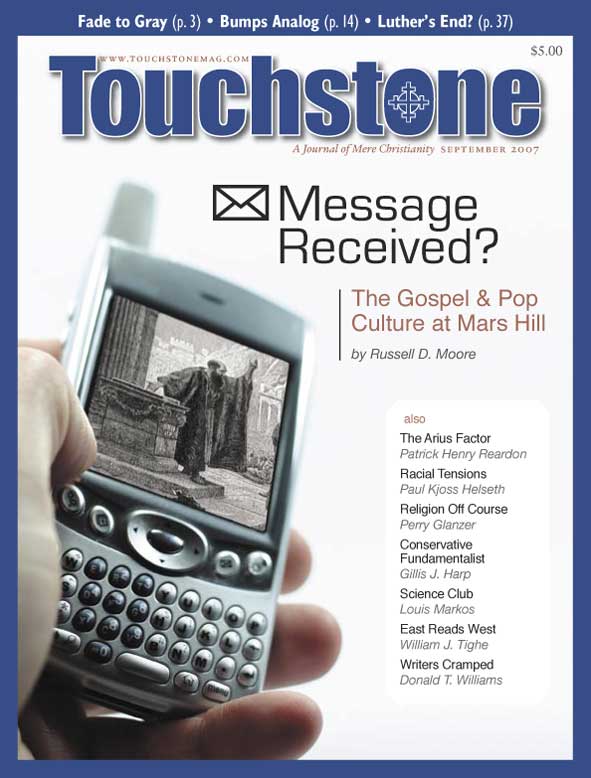Feature
Retaking Mars Hill
Paul Didn’t Build Bridges to Popular Culture
Take your choice: Christian boy bands or The Gospel According to the Simpsons. The era of the Christian who boycotted the local “movie house” is long gone—and, in many ways, that’s a good thing. But in place of the certainty that the gospel required Christians to keep themselves separate from the world of popular culture, many Christians are now just confused about how to relate the two.
Offering one answer to this confusion, many contemporary Christians often speak of the need to “engage” popular culture. What they most often mean by this is that they seek to speak in a language people shaped by popular culture can understand or that they want to “redeem” popular culture for the glory of Christ.
In my world, the world of American Evangelicalism, at least two groups have clear ways to do this. One group wants to imitate pop culture but Christianize it. Another group wants to find ways in which that culture itself presents the gospel. Both want to use pop culture to reach the wider culture, and both find their justification in Paul’s talk on that first-century Athenian hilltop described in Acts 17.
And they are right to try: If Christians are going to speak to people, Christians as well as others, who have been deeply formed by popular culture (as we must) without losing our souls, we’re going to have to decipher how to relate Mars Hill to Rolling Stone.
Off-Brand
The first model of Evangelical pop-culture engagement is that of those I call “off-brand Evangelicals.” They seek to take trends in pop culture and reproduce them in Christian dialect for use within the Evangelical subculture, with the hope of making it more attractive not only to those outside but to those within.
The impulse is deeply biblical. After all, God sanctifies commonplace, so-called secular aspects of human culture—from the rearing of sheep for sacrifice, to the goat hair used to construct the Tabernacle, to the bread and wine of the Lord’s Table. Pagans have victory suppers whentriumphant in war—so does the church, but in a uniquely Christian way.
Adapting current cultural forms for use as Christians is not, in itself, a bad idea. In fact, in many ways it is unavoidable. If our pulpits are successful in persuading Christians that Jesus is to be the central focus of the believer’s life, we should not be surprised but joyful when young Christians gifted to be hip-hop artists rap about Jesus rather than about pimps and firearms.
Still, there is a danger in a kind of co-option of popular culture for Christian use that does not discern the limits of the evangelistic and apologetic potential of such a strategy. This is especially true when the impetus behind so much of it is not ecclesial or missionary but commercial.
GQ magazine sent one of its reporters to a Christian music festival in Pennsylvania, to check out what goes on in the “Religious Right” subculture. “Christian rock is a genre that exists to edify and make money off of Evangelical Christians,” the author concluded after scoping out the Evangelical version of Woodstock.
Russell D. Moore is president of the Ethics and Religious Liberty Commission of the Southern Baptist Convention. He is a senior editor of Touchstone.
subscription options
Order
Print/Online Subscription

Get six issues (one year) of Touchstone PLUS full online access including pdf downloads for only $39.95. That's only $3.34 per month!
Order
Online Only
Subscription

Get a one-year full-access subscription to the Touchstone online archives for only $19.95. That's only $1.66 per month!
bulk subscriptions
Order Touchstone subscriptions in bulk and save $10 per sub! Each subscription includes 6 issues of Touchstone plus full online access to touchstonemag.com—including archives, videos, and pdf downloads of recent issues for only $29.95 each! Great for churches or study groups.
Transactions will be processed on a secure server.
more on culture from the online archives
more from the online archives
calling all readers
Please Donate
"There are magazines worth reading but few worth saving . . . Touchstone is just such a magazine."
—Alice von Hildebrand
"Here we do not concede one square millimeter of territory to falsehood, folly, contemporary sentimentality, or fashion. We speak the truth, and let God be our judge. . . . Touchstone is the one committedly Christian conservative journal."
—Anthony Esolen, Touchstone senior editor













